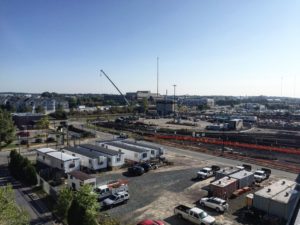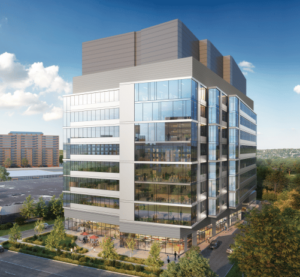
An MBTA Orange Line train pulls into Wellington station. As demand for housing and life science space rises, Medford officials are tapping into a long-ignored potential development site.
A looming $8 million budget deficit was a wake-up call to Medford officials about the need to expand the tax base through real estate development.
City officials are looking at long-neglected opportunities to expand the commercial base, starting with air rights development rights for 28 acres at the MBTA’s Wellington Station. The city will issue a request for information from private developers in late summer.
Mayor Breanna Lungo-Koehn said the city will seek projects that include a large housing component, along with retail and other commercial space.
“That could be almost a small city in itself. We definitely want to play a part as far as the affordable housing crisis is concerned,” she said. “We see it as being a destination where nobody even needs a car to get around.”
Elected in 2019, Lungo-Koehn said Medford is trying to shed its reputation as being a difficult place to do business for real estate developers. The administration is negotiating with developers of three long-stalled apartment projects that would total more than 1,000 units. City Hall departments that oversee planning, housing production and economic development have been consolidated to improve lines of communication. And a pending draft comprehensive plan could lead to the first citywide rezoning since the 1960s.
The search for additional property tax revenues comes amid a fractious budget debate between Lungo-Koehn and the City Council’s progressive majority elected in 2021. The mayor has proposed a $3 million Proposition 2 ½ override in November, while councilors have argued for a $12 million increase.
Station Landing Pioneered Transit Focus
Medford has owned the Wellington station property’s air rights since the 1970s, under legislation sponsored by former mayor and state Rep. John McGlynn. No projects have ever been completed on the air rights section, but the over 1 million-square-foot Station Landing mixed-use development was built from 2006 to 2020 by National Development on 16 acres just east of the MBTA station, connected to transit by a long, covered pedestrian bridge.
A preliminary planning document indicates that the city will offer a “priority development site” spanning nearly 11 acres of parking lots on the east side of the MBTA tracks near the Malden River, and another 17-acre site above the rail maintenance and storage facility.
Air rights development at Wellington would be the most dramatic example yet proposed to implement the goals of Massachusetts’ year-old Housing Choice law, which requires MBTA communities to allow multifamily zoning by-right near transit stops.
“It’s a complicated site,” said Sarah Barnat, a multifamily developer and former Urban Land Institute Boston/New England executive director. “But the MBTA has a limited amount of land around transit, so it’s really coming down to the cities and towns to focus around the transit nodes, and proportionately densify.”

Medford officials are by seeking proposals for a 28-acre air rights development site at that covers both the parking lots and train storage yard at the MBTA’s Wellington Orange Line station. Photo by Steve Adams | Banker & Tradesman Staff
Active Rail Yard Offers Challenges
City officials have not released specifics on the amount of potential development sought for the property.
Developer John Preotle has seen several waves of economic and real estate cycles wash through the Wellington area as master developer of the River’s Edge project, which includes a 230,000-square-foot office building and two apartment complexes totaling 504 units completed over the past decade next to the Malden River.
Preotle said the 10-acre parking lot is the most desirable portion of the MBTA property. The 18-acre west parcel includes active MBTA repair, maintenance and storage facilities, complicating construction schedules and adding project costs.
“You can build a lot on 10 acres if it makes sense economically,” Preotle said. “Can you take the air rights [on the west parcel] and transfer them and build more on the other side? I don’t know those answers, and maybe they are still figuring that out.”
The MBTA did not return a request for comment. Lungo-Koehn said agency staff have objected to some elements of the RFI, while not naming specifics, and the two sides remain at odds on some details. The project would require close coordination to avoid disrupting MBTA operations, similar to the lane closures associated with a pair of air rights projects over the Massachusetts Turnpike in the Fenway and Back Bay.
“We don’t think [the MBTA response] is sufficient, so we’re going ahead with a full RFI and see what interest is there, along with the T and the public, to find the best use for that location,” Lungo-Koehn said.
Commercial Corridors Could Be Rezoned
Development opportunities in Medford have been limited by outdated zoning codes, which require developers to obtain variances or zoning changes for in-demand uses such as life science and housing. A comprehensive plan will be released this summer, potentially leading to the first citywide rezoning since the 1960s.
Cambridge-based consultants Agency Landscape + Planning will release the draft plan this month, including recommendations for rezoning Mystic Valley Parkway and Mystic Avenue. Both corridors are occupied by low-density commercial and industrial uses, but have been in demand by multifamily housing developers in recent years.

RISE Together recently won Zoning Board of Appeals approval for a lab building near Wellington Circle. Image courtesy of Cube3 Architects
More recently, life science is starting to make inroads. Boston-based RISE Together received city Zoning Board of Appeals approval this month to demolish the Bertucci’s restaurant at 4054 Mystic Valley Parkway for an 8-story, 250,000-square-foot life science building.
In the Hillside neighborhood near Tufts University, Cummings Properties and Elizabeth Grady Properties are proposing to rezone 200 and 222 Boston Ave. for additional office and life science space.
New Contacts for Developers at City Hall
After defeating incumbent Mayor Stephanie Muccini Burke in 2019, Lungo-Koehn reorganized city departments that are most closely connected to development and land use. The changes included creating a new office of planning, development and sustainability, and the hiring of the city’s first economic development director, Viktor Schrader, in 2021.
“One of the reasons I ran is that our commercial tax base was steadily decreasing, and the only things really being built were luxury housing and I saw a big problem with that,” said Lungo-Koehn, a former city councilor.
Negotiations with three developers could accelerate housing production. More than 1,000 units are proposed under Chapter 40B, Massachusetts’ affordable housing law. But the ZBA invoked a “safe harbor” provision in 2020, arguing that the city has reached the 1.5 percent land area minimum devoted to affordable housing and no longer needs to review proposals under the law.
That determination is under review by the Massachusetts Housing Appeals Court. In the meantime, the administration has been negotiating with all three developers on changes to their proposals that could move them forward, Lungo-Koehn said. The projects include redevelopment of a self-storage facility on the Fellsway by The Davis Cos., a former MassDOT sign shop on Mystic Avenue by Combined Properties and a Gold’s Gym-occupied property on Mystic Valley Parkway by Mill Creek Residential.

Steve Adams
Mill Creek Residential recently reduced its proposal from 400 to 350 units, redesigned the facade and added ground-floor retail, prompting the ZBA to resume its review of the project.
Schrader, who previously was an economic development official in suburban Chicago, said officials also want to make it easier for smaller multifamily development firms to build neighborhood-scale projects in Medford and are giving them more guidance in the permitting process.
“We’re being very hands-on and we want to let folks know that’s the case,” he said.
City Council Vice President Zac Bears, who has been an outspoken advocate for additional spending, said it’s a step in the right direction.
“That’s been helpful working with specific folks like RISE Together, but there’s only so much that one person can do in having those conversations. As much as it’s an improvement, it’s still a bottleneck,” he said.





